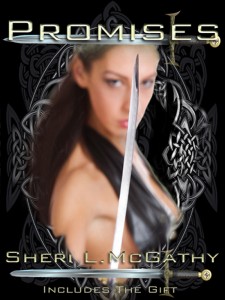 I’m currently working on revising Time’s Fugitive, my second time travel romance, and sequel to my upcoming release, Time’s Enemy. Like Enemy, the first draft of this book was written a few years ago. What’s surprising is how many things in the world around us have changed since then – things that now need to be changed. For example, I have a scene where a character’s car breaks down, and the young driver and her passenger need to walk for help. Yes, they have cell phones – it wasn’t written that long ago – but what I now need to account for is the fact that many late-model cars (including the one they have) now come with some kind of navigation system, which also includes a way to call for help. This needs to be revised so that there’s a good reason they can’t just press the red button on the rearview mirror and get help from OnStar. Another book of mine features computer technology – including national security-sensitive software that goes missing. In the original book, written over ten years ago, the software was on a removable disk cartridge, like a Zip Disk. (Anyone remember those?) In a recent revision, this needed to be changed to be on a USB flash drive.
I’m currently working on revising Time’s Fugitive, my second time travel romance, and sequel to my upcoming release, Time’s Enemy. Like Enemy, the first draft of this book was written a few years ago. What’s surprising is how many things in the world around us have changed since then – things that now need to be changed. For example, I have a scene where a character’s car breaks down, and the young driver and her passenger need to walk for help. Yes, they have cell phones – it wasn’t written that long ago – but what I now need to account for is the fact that many late-model cars (including the one they have) now come with some kind of navigation system, which also includes a way to call for help. This needs to be revised so that there’s a good reason they can’t just press the red button on the rearview mirror and get help from OnStar. Another book of mine features computer technology – including national security-sensitive software that goes missing. In the original book, written over ten years ago, the software was on a removable disk cartridge, like a Zip Disk. (Anyone remember those?) In a recent revision, this needed to be changed to be on a USB flash drive.
This reminded me of Stephen King’s The Stand – which I first read in the late 90’s, after it had been updated from the original version published in 1976. Definitely a book I enjoyed, despite a few details where not enough attention was given to updating. In the original version, characters drove across a post-apocalyptic U.S., preferably in the largest vehicles practical – in most cases, station wagons.
In the 90’s version, these characters were still taking station wagons.
Huh? In the 90’s I remember, there were a heck of a lot more minivans and SUVs than station wagons. Not to mention, a 4WD SUV would be much more practical than a station wagon, especially for driving off road. And cell phones? I don’t remember if they were mentioned – they might’ve been, and there was no power, hence no operable cell networks. But the characters used CB radios to communicate – which hit their heyday in the mid-70’s.
So think about those updates when you’re revising an old novel – I still enjoyed The Stand, but little details like this did take me out of the story, and remind me I was reading. So if the contemporary American heroine in the book you’re reading is in trouble and she’s not using her cell phone, you might flip to the copyright page, and see if you’re reading an old book. Otherwise, there’d better be a good reason that heroine can’t just call for help, or you might have an Update Fail on your hands.
Does it bother you to read books where the details are outdated? I’m willing to forgive it if it’s an old book, but otherwise, it might just be sloppy writing. What do you think?




